POLAR VORTEX, the book
A ‘Best Graphic Novel’ of 2024 is by an Iowa native—and she granted me an interview
I was so moved by a book, I immediately reached out to the author to request an interview.
And then I took more than six months to post it. But I got kind of rewarded for my procrastination. (More on that in a bit.)
Last spring, I was browsing through Prairie Lights Books when a cover caught my attention. I was in the graphic novel section, perusing personal stories, (by which I mean no sci fi, no series, no superheroes. I’m that type of graphic-novel gal.)
While I mostly read novels and non-fiction, something about the graphic novel genre—graphic memoir, actually—grips me like no other.
As a once-English major trained to revere great, dead-white-guy Literature, I was initially skeptical of the “graphic” novels I heard people talking about (um… are they dirty?). But then a converted fellow English-major-friend urged me to try a then-new book called Fun Home. I’ve never been the same since.
Flipping through the book that had caught my attention in Prairie Lights, I decided I couldn’t stand the wait if I put this book on library hold; I simply had to have it. The title, description, and cover image drew me in—even though I could tell the subject matter, (a woman returning home to tend to her elderly mother with dementia), wasn’t exactly lighthearted. Why would I subject myself to unnecessary sadness? (Especially when I’d already witnessed the devastating impact of the disease on both of my late grandmothers?)
But when I got it home and started to read, every page affirmed my instinct.
And then, lo and behold, the narrator—based upon the real-life illustrator Denise Dorrance—lands “back home” at the airport in Cedar Rapids, Iowa. (Which is not too far from Davenport, where I live.)
I managed to wait until finishing the book before doing a Google search. Had I found this book in Iowa City because this was perhaps a local author and maybe a regional publisher?, I wondered.
But in addition to landing on a feature from The Guardian UK, I discovered that the book was recommended on a site whose name you may recognize:
from Oprah Daily:
“With gallows humor, visual ingenuity, and a whole lot of heart, Dorrance chronicles the two chilling months she returned home to care for her ailing mother—while a literal polar vortex looms in the background.”
I found a way to contact the author—and was thrilled when she wrote back.
And now that I’m finally publishing this post, I was going to add that I’m ashamed of how long it took me to put it together, (considering that I read the book in May, and now an actual polar vortex could suck us in). But it’s actually great timing, because the book has since racked up many more accolades. I learned that Polar Vortex has been…
named ‘a Best Graphic Novel of 2024’ by:
New York Public Library
The Hollywood Reporter
Library Journal
The Observer newspaper (UK)
(And now, a French version is planned for April. Oui!)
Author Interview: Denise Dorrance
Author of Polar Vortex: A Family Memoir on her (Crayola-covered) Iowa childhood, whether she’s European or Midwestern, and the creation of this beautiful work.
Alison: Thank you for agreeing to do this interview, Denise! I’ve got your official bio, but I was hoping you could summarize in your own words how you went from Iowa to New York City and then the U.K.
Denise: I graduated from (the former) Hawkeye Tech in Waterloo with a Graphics Art degree and, with an ambition to be a fashion illustrator, quickly moved to NYC.
There, I worked as a fashion assistant (Cosmo mag), a picture editor (Art & Antiques) and finally an agent (Magnum Photos). Not one job had anything to do with illustration!
NYC lost its sparkle for me, and I fell in love with a Brit (to whom I’m now married) and moved to London. There I found myself working as a TV producer. It wasn’t until I had my son that I FINALLY started drawing again—sketching little funny stories for him, which turned into cartoons. Those were seen by a magazine that launched my career as a cartoonist.
I’m most well known for “Mimi,” a stylish, selfish mum with a baby that has to fit into her life…and her handbag when she goes shopping. She ran for nearly six years in The Mail on Sunday UK. We published a collection of the cartoons in the book ‘It’s all about Mimi.’
Let’s talk about graphic memoirs as a genre. Before writing Polar Vortex, had you been a longtime fan, or ever considered writing one yourself?
I grew up reading Archie comics, then as an adult found graphic novelists: Posy Simmonds, Marjane Satrapi, Rutu Modan.
I’ve had a long career as a cartoonist, and started hankering to tell a longer story, but I needed a good story! So it took me a long time to find it. But my mom’s dementia and the way it imploded in my family became the one I had to tell.
The book has been receiving great critical acclaim. What do you hear from readers?What it’s like to put this very personal story out into the world?
It’s been so amazing and unexpected. I mean, you dream of this kind of response, but now that it’s happened I feel a bit dazed. And grateful.
It means so much to me when the story of Polar Vortex touches people in a very personal way—I hear this from a lot of readers, and I think it’s a story of our times.
One of my favorite stylistic devices of yours was to place vintage images right in the middle of the modern-day story. One of them was of an old local hospital.
I loved using the vintage postcards of historic Cedar Rapids, and I think it’s a nice compliment to the drawn line. Memory and home are important themes in the story, and I think these postcards add an important nostalgic texture for the reader.
As I’m sure others have commented, the topic of the book is undoubtedly sad, but you effectively weave humor throughout.
I tend to see humour in the darkest corners; I guess it’s my way of coping, but also in writing a story about dementia (and let’s be honest, death), I absolutely had to bring in humour, otherwise it’s just too heavy and sad.
My mom and I laughed a lot during this very upsetting phase of her life—she had a great sense of humour!
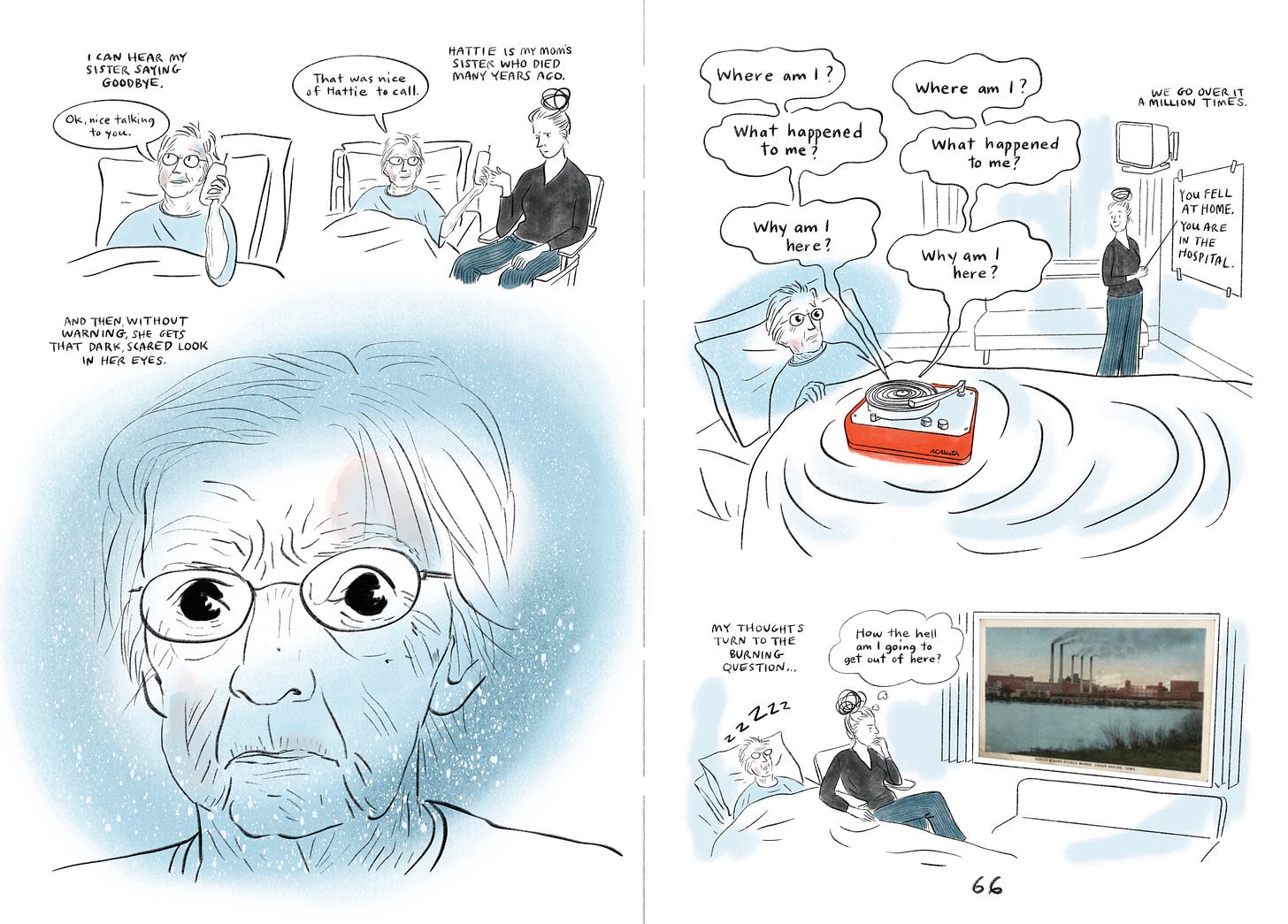
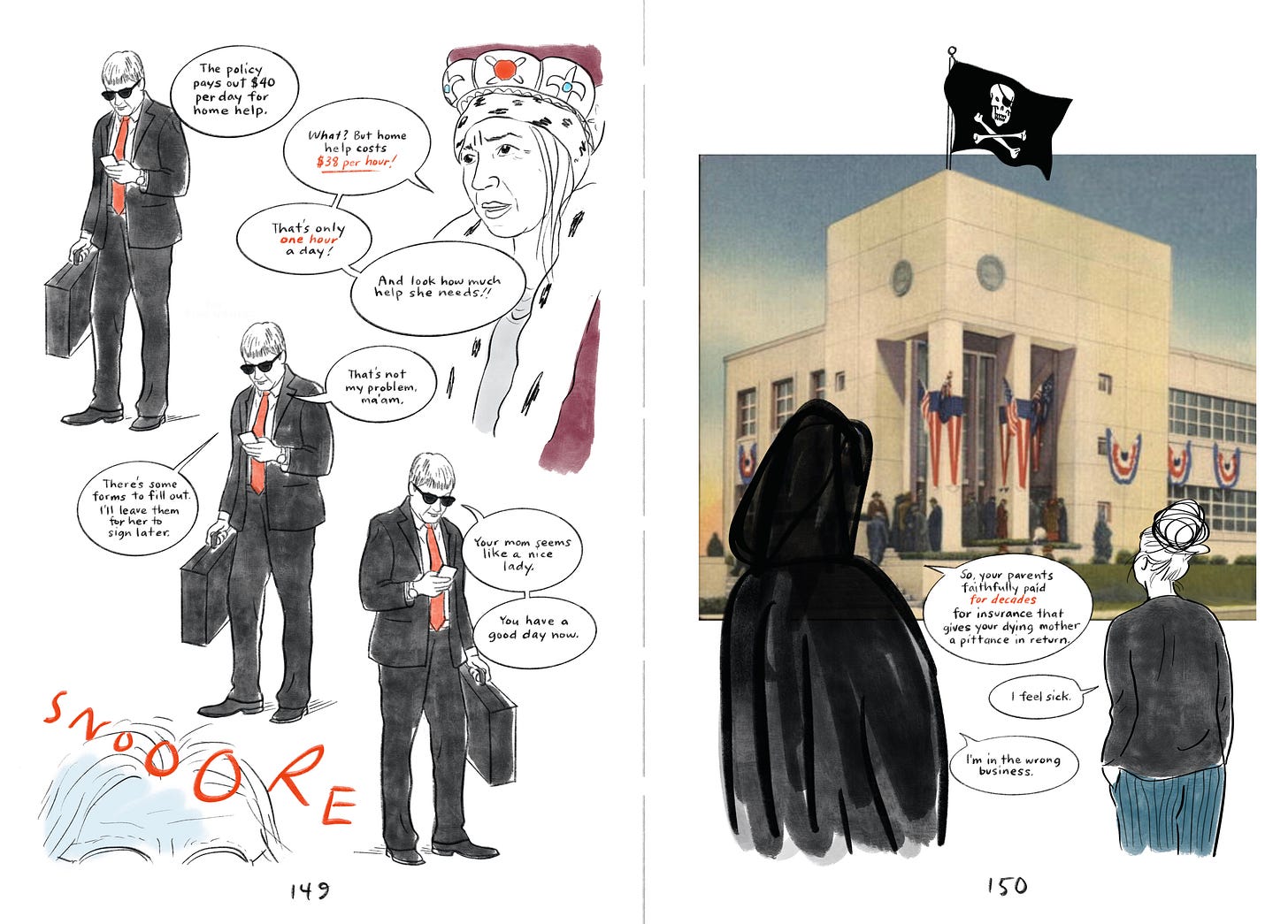
When your character is back home for an unexpectedly extended stay, you connect with a lifelong friend. Your mom remained in Cedar Rapids as a widow into old age. What’s your connection to your geographical upbringing now? Is it home?
Well, I’ve lived in the UK longer than the States but I’ll never be British, (even though I hold dual citizenship). And yet I no longer feel like an American, so I drift someplace mid-Atlantic. But increasingly I appreciate that the place of my birth, Cedar Rapids, was a very fine place to grow up.
I’m a Midwesterner with deeply forged experiences particular to that flat and verdant land—I’m happiest in an open field.
I’m a Midwesterner with deeply forged experiences particular to that flat and verdant land—I’m happiest in an open field.
Was there any particular aspect of growing up in Iowa that inspired you to become an artist/illustrator?
My childhood is a list [of those inspirations]: going to camp, singing in church, skateboarding down our bumpy sidewalk, learning to swim, and snow—lots of snow.
My first artistic memory is using an entire red crayon to color in an apple—when I rubbed my hand over it, it felt like an actual waxy apple.
Do you ever have reason to return for a visit?
Sadly, I haven’t been back since my mom moved to live with my sister, where she died. The family home was sold and so my connections there are minimal now. My best friend lives in Des Moines and she’s looking after boxes of things I kept from my family home, which I’ll need to retrieve at some point!
What, if anything, do you miss about Cedar Rapids, Iowa, or the Midwest?
Ha, my first impulse is to say Kringla—a soft Norwegian cookie my mom used to make and send to me in London.
What’s next for you?
I’m taking a good long break while ideas bubble up. I really want to do another graphic novel, but funny enough I’m back to square one—what’s the story?!
There’s one more thing …Considering the difficult family decisions you’d had to make, I’ve been wondering whether you and your sister were able to work things out. Is that okay for me to ask?
So, in real life my sister and I didn’t recover from the rupture of my mom’s dementia in our lives, and I know this is very common to lots of people. I decided to write a new version, and the emotional reunion we have in the book is simply how I would’ve dreamed it to work out.

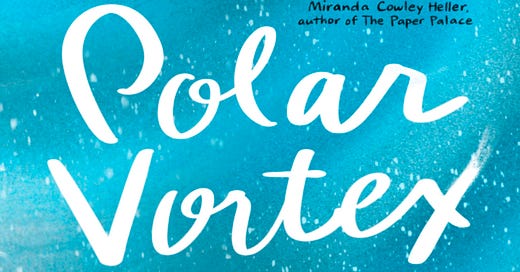


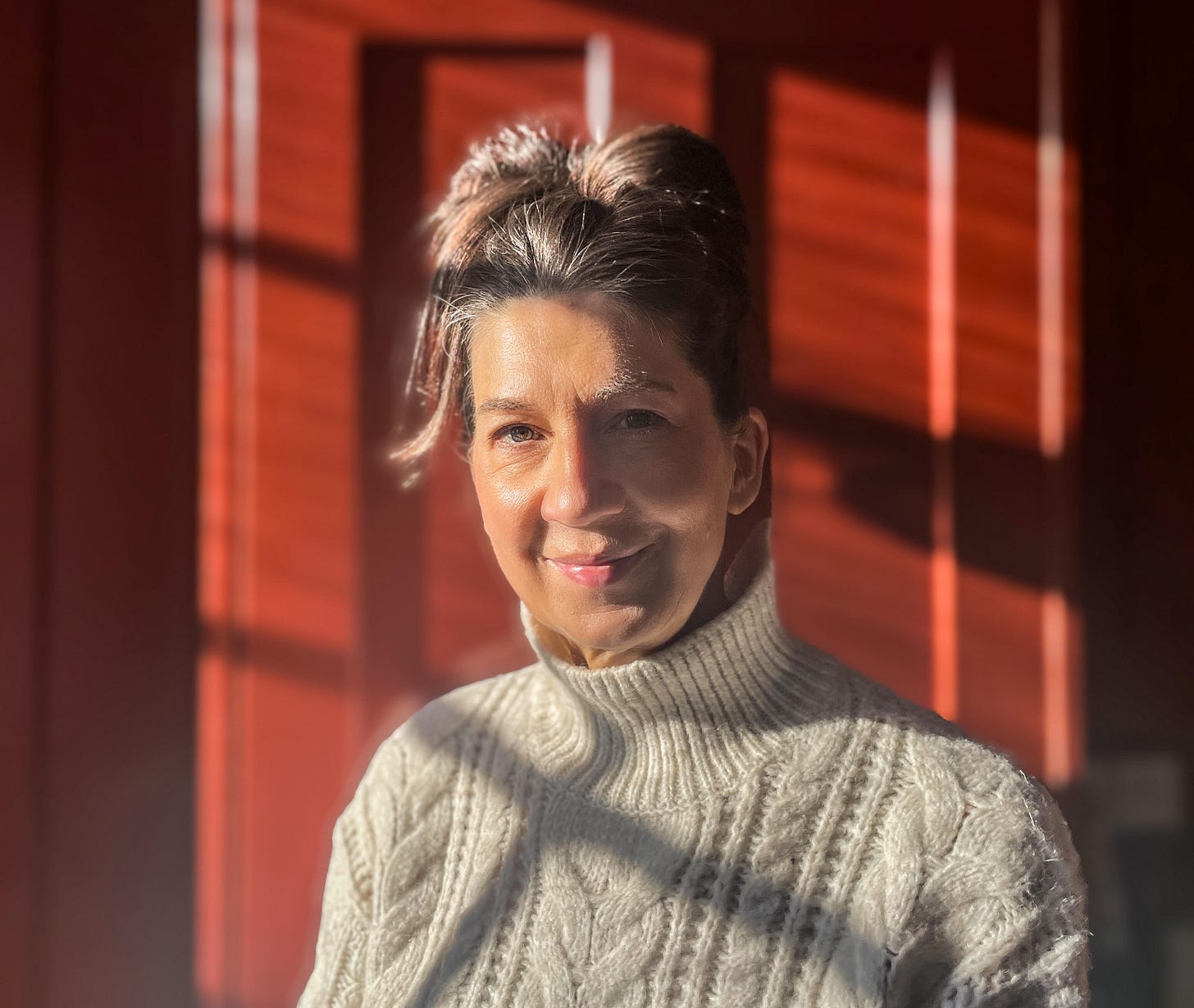

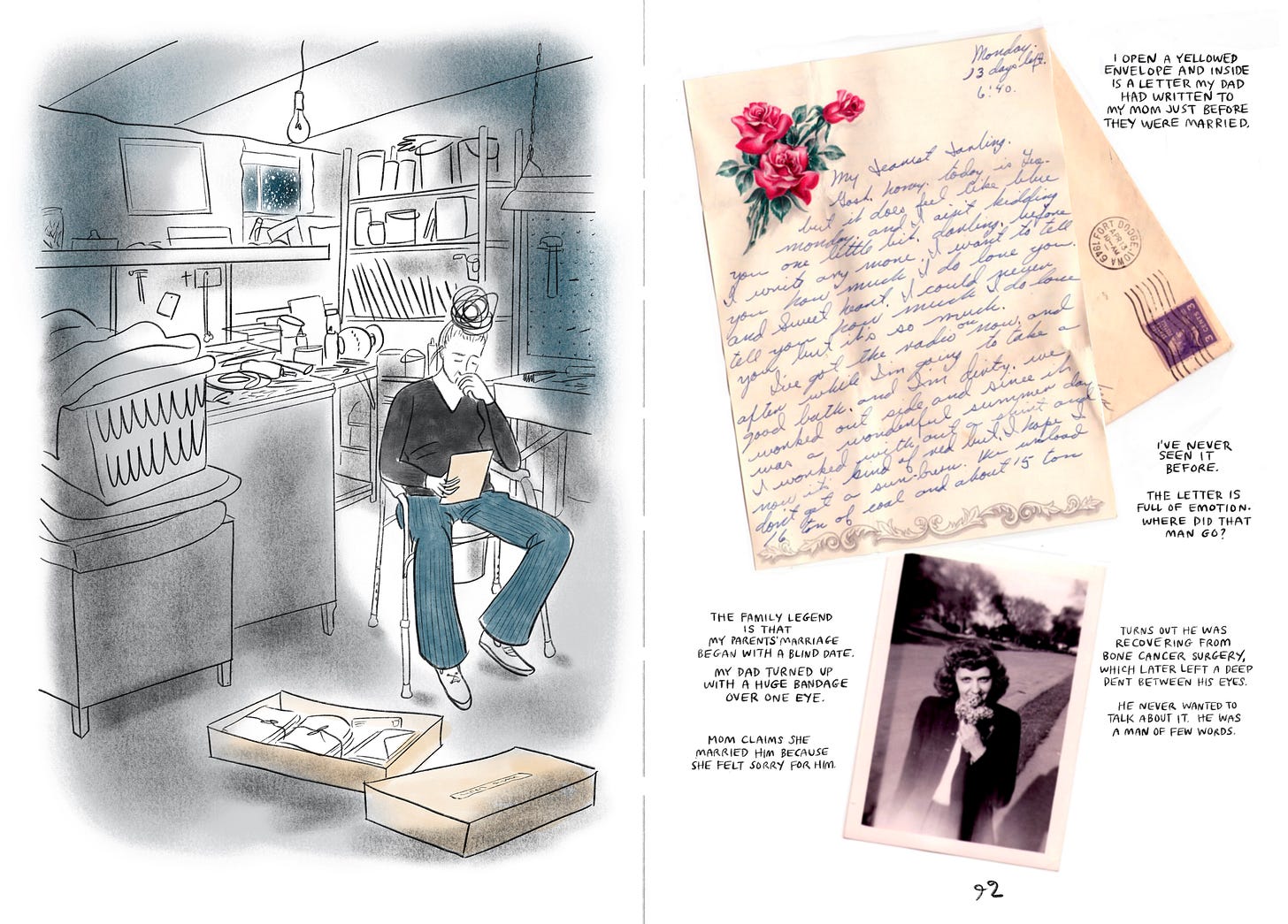
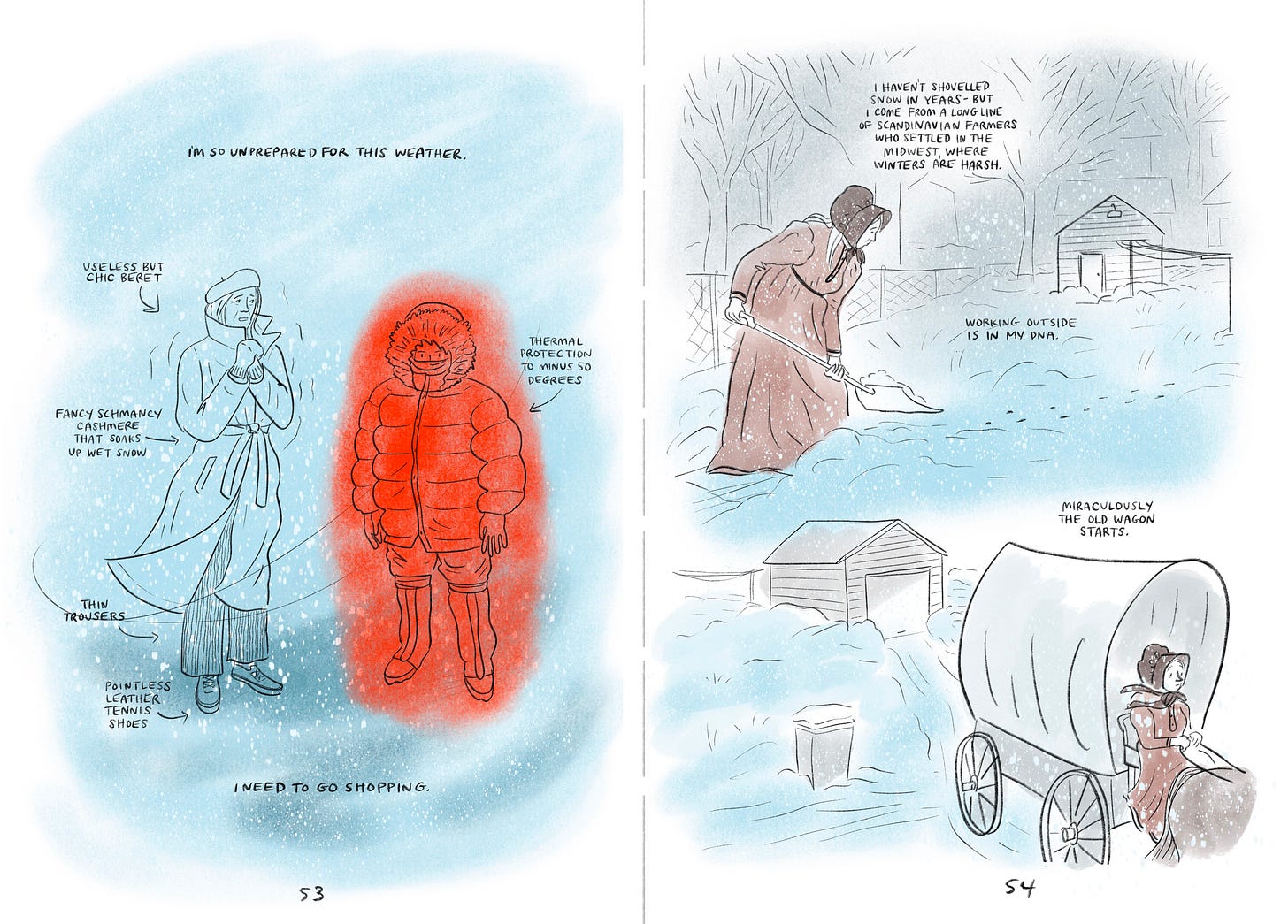
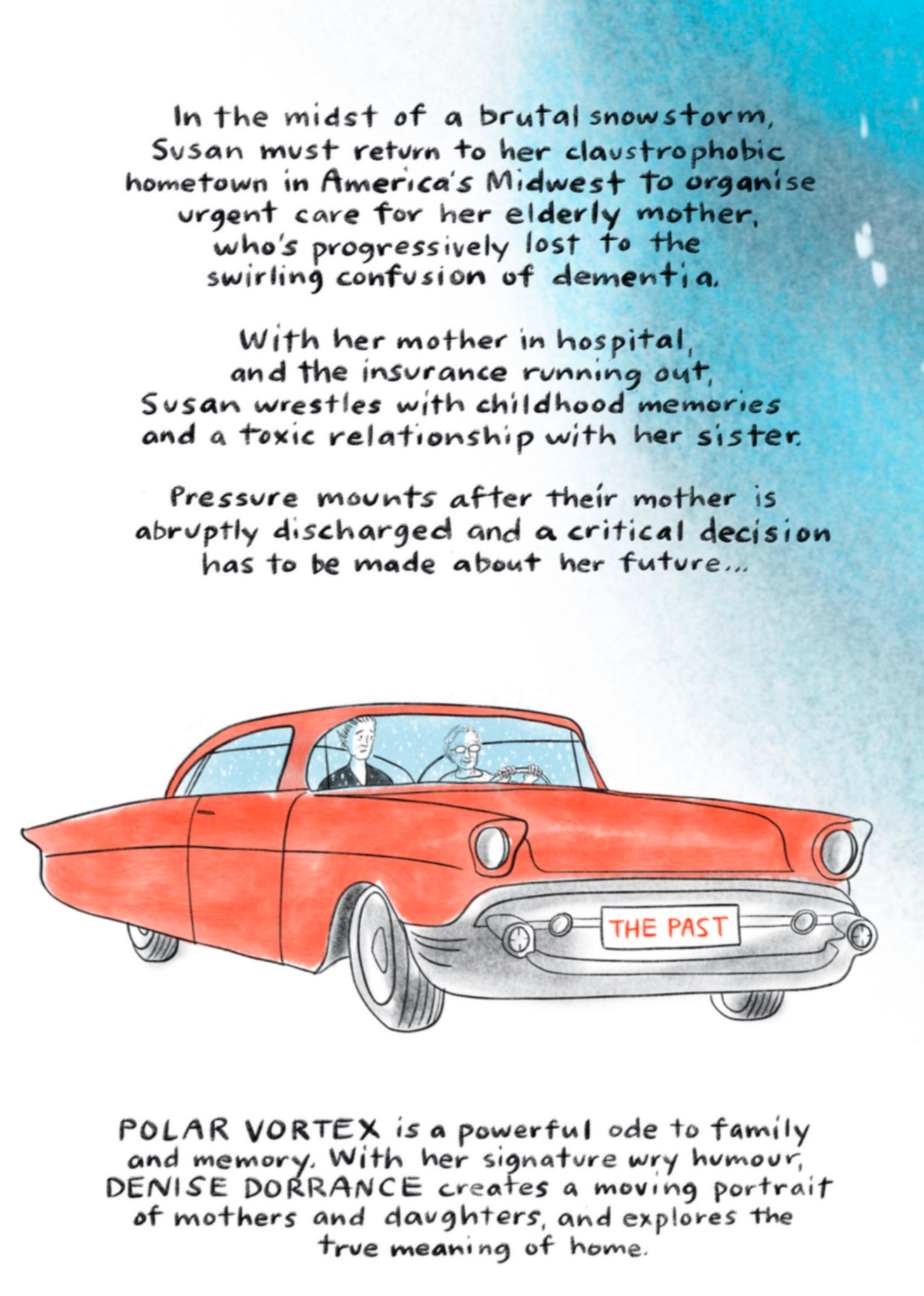
Alison thank you for your thoughtful questions. I hold Iowa and Cedar Rapids close to my heart! I hope more people find their way to my book, especially readers who haven’t tried a graphic novel before. I’d love to know what you think! 💙❄️
👍Enjoyed the story and learning about graphic novels? Is there one in your future??